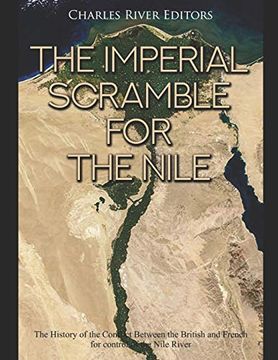The Imperial Scramble for the Nile: The History of the Conflict Between the British and French for Control of the Nile River (en Inglés)
Reseña del libro "The Imperial Scramble for the Nile: The History of the Conflict Between the British and French for Control of the Nile River (en Inglés)"
*Includes pictures*Includes a bibliography for further reading“Before this time tomorrow I shall have gained a peerage, or Westminster Abbey.” – Admiral Horatio Nelson before the Battle of the NileIn 1798, an initial review of France’s naval forces had led Napoleon to conclude his navy could not hope to outfight the power of the Royal Navy, which had been the dominant naval power for centuries, so he was forced to look elsewhere. After months of planning, Napoleon crafted a scheme to attack and conquer Egypt, denying the British easy access to their colonies in India, with the ultimate goal of linking up with the Sultan Tipoo in India itself and defeating the British in the field there. Napoleon sailed with Admiral Brueys and 30,000 troops that June, heading for Egypt. Notionally part of the Ottoman Empire, Egypt was de facto a weak independent regime run by the breakaway Mamelukes. For France, it offered an overland route to India and a chance to beat Britain at her own game via economic strangulation. Napoleon could not have known it, but his campaign was the start of 150 years of imperialism along the Nile River, as Europeans endeavored to explore, control, and colonize the Nile River. This would bring them into all kinds of conflicts, not just with the indigenous natives residing there but also with each other, as each empire sought to get a leg up on the competition. Napoleon’s Egyptian Campaign failed in all of its objectives other than in the acquisition of knowledge. Far from frustrating British ambitions in the Orient, the British triumphed in the minor war that Napoleon triggered, and it was the British who would dominate Egypt for the next 150 years. Even after the British took control of Egypt, knowledge about the Nile remained sparse, most importantly the source of the river, and exploration all over the continent took place among adventurers of various nationalities. Other countries also sought to get a foothold on the continent, to the extent that near the end of the 19th century, Otto von Bismarck, the German chancellor, brought the plenipotentiaries of all major powers of Europe together to deal with Africa's colonization in such a manner as to avoid provocation of war. This event, known as the Berlin Conference of 1884-1885, galvanized a phenomenon that came to be known as the Scramble for Africa. The conference established two fundamental rules for European seizure of Africa. The first of these was that no recognition of annexation would granted without evidence of a practical occupation, and the second, that a practical occupation would be deemed unlawful without a formal appeal for protection made on behalf of a territory by its leader, a plea that must be committed to paper in the form of a legal treaty.This began a rush, spearheaded mainly by European commercial interests in the form of Chartered Companies, to penetrate the African interior and woo its leadership with guns, trinkets and alcohol, and having thus obtained their marks or seals upon spurious treaties, begin establishing boundaries of future European African colonies. The ease with which this was achieved was due to the fact that, at that point, traditional African leadership was disunited, and the people had just staggered back from centuries of concussion inflicted by the slave trade. Thus, to usurp authority, to intimidate an already broken society, and to play one leader against the other was a diplomatic task so childishly simple, the matter was wrapped up, for the most part, in less than a decade.Even at that stage, however, the countries would keep jostling for position in Africa against each other, attempting to snap up more land and consolidate it. As such, the scramble kept going at a fevered pitch until the outbreak of World War I. The This book chronicles the competition between both countries for control of strategic parts of the continent.

